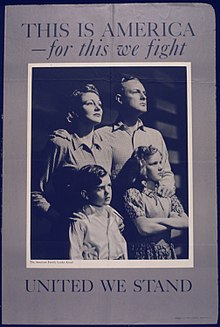"We want grandparents to strike to prove they are a key part of the way this country functions," said Manuel Pastrana, leader of the UGT general workers’ union in the southern region of Andalucia. "Learn to say no" and "don’t feel guilty" are the slogans, aimed at so-called "babysitter grandparents".
「我們希望祖父母用罷工來證明他們是這個國家運作的關鍵環節,」西班牙南部安達魯西亞區總工會UGT領袖帕斯特拉納說。「學會說不」和「無須愧疚」則是罷工的標語,目標就是針對所謂的「保母祖父母」。
"United We Stand, Divided We Fall,"
Britain's banking commission
Britain’s banking commission has proposed a strict divide between retail and investment banking"United We Stand, Divided We Fall," a favorite toast, in varying forms, of political orators from Benjamin Franklin to Abraham Lincoln. It gained currency after John Dickinson's "Liberty Song" was published on 18 July 1768, in the Boston Gazette. The work contained the lines:
Then join in hand, brave Americans all—The slogan regained widespread usage three-quarters of a century later when the popular writer George Pope Morris's "The Flag of the Union" appeared. The poem quoted the sentiment as given above, from the motto of Kentucky, which had been adopted in 1792. Gaining new currency during times of national crisis, the phrase was most recently a popular slogan after the attacks upon the World Trade Center and the Pentagon on 11 September 2001.
By uniting we stand, by dividing we fall!
Bibliography
Furtwangler, Albert. American Silhouettes: Rhetorical Identities of the Founders. New Haven, Conn.: Yale University Press, 1987.
"United We Stand, Divided We Fall,"的文化史,部分
"United we stand, divided we fall" is a phrase used in many different kinds of mottos, most often to inspire unity and collaboration. Its core concept lies in the collectivist notion that if individual members of a certain group with binding ideals – such as a union, coalition, confederation or alliance – work on their own instead of as a team, they are each doomed to fail and will all be defeated. The phrase is also often referred to with only the words "United we stand".
Historical origin[edit]
The phrase has been attributed to the ancient Greek storyteller Aesop, both directly in his fable "The Four Oxen and the Lion"[1] and indirectly in "The Bundle of Sticks".[2]
https://en.wikipedia.org/wiki/United_we_stand,_divided_we_fall
Supreme Court Moving Beyond Its Old Divides
By ADAM LIPTAK 11 minutes ago
Led by Chief Justice John G. Roberts Jr., the court over the past term sometimes worked with striking unanimity and assertiveness to review the actions of the other branches of government.
Besides intensifying partisanship and conspiracy theories — think the birthers — the Internet divides the world more firmly into niches, birds of a feather avidly flocking together.
Conspiracy theories about the citizenship of Barack Obama are ideas that reject the legitimacy of the United States citizenship of President Barack Obama or his eligibility to be President of the United States. Some of these conspiracy theories allege that Obama was born in Kenya, not Hawaii, and that his birth certificate is a forgery. Others allege that Obama is a citizen of Indonesia, or that because he had dual citizenship at birth (British and American), he is not a natural born citizen of the United States, which is a requirement to be President of the United States under Article Two of the United States Constitution. These conspiracy theories received attention in mid-2008 following Obama's victory in theDemocratic primaries, in late 2008–early 2009 with regard to theElectoral College vote and Obama's inauguration, and again in mid-2009 following a lawsuit by Army reservist Stefan Cook.
肺炎新解:"分則生、合則死",改自 "united we stand, divided we fall" 出自美國建國元老John Dickinson.更早的版本可推到伊索寓言。
divide[di・vide]
- 発音記号[diváid][動](他)
2 [III[名]([副])]〈道路・川などが〉…を隔てる, 分界する, …と(…を)分ける, 分離する, の境をなす((off/from, and ...)). ⇒SEPARATE[類語]
3 [III[名]([副])]〈物を〉(…の間で)分配する, 〈時間などを〉(…と…に)配分する, 割りふる((out, up/ among, between ...))(⇒BETWEEN[語法]);〈物を〉(人と)分ける((with ...))
4 〈人・意見・感情などを〉分裂させる;〈人の〉仲を裂く
5 [III[名]([副])]…を(…に)分類する((into ...))
6 [III[名]([副])]
(1) [divide A by B/divide B into A]〈A(数)をB(数)で〉割る, 等分する
(2) …を割り切る
(1) [divide A by B/divide B into A]〈A(数)をB(数)で〉割る, 等分する
(2) …を割り切る
8 divides 24.
24は8で割り切れる.
(3) 〈定規などに〉等間隔の目盛りをつける.24は8で割り切れる.
7 ((英))〈議会・委員会などを〉(…について)賛否の二派に分ける((on, over, about ...)).
━━(自)(←(他))
1 (…に)分かれる, 割れる((into, in ...));分岐する
4 ((英))(…の)賛否を採決する((on ...))
Divide!
採決.
採決.
divide and rule
分割し統治する.
━━[名]
3 境界線, 分かれ目.
[ラテン語dīvidere(dī-離れて+videre分かれる). △WIDOW]babysitter grandparents 一般人的說法是"帶小孩的老人家"嗎
babysitter[名]
1 ベビーシッター(sitter).
2 監視人.




沒有留言:
張貼留言